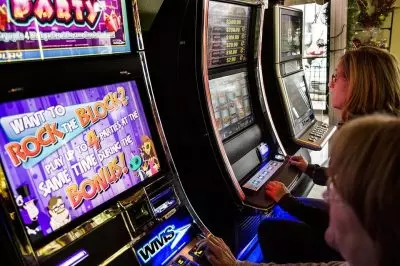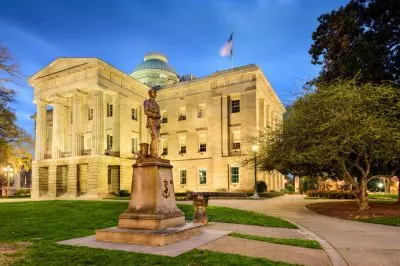 A new bill that seeks to legalize and regulate video gambling machines was recently discussed by the North Carolina House Commerce Committee, renewing the efforts toward eradicating illegal video gaming in the Tar Heel State. Sponsored and submitted by House Representative Harry Warren, House Bill 512 proposes the Lottery Commission should be granted the authority to oversee and tax video gambling machines in authorized locations. Businesses, video terminal manufacturers, and authorized operators would be taxed on a per-machine basis, with tax proceeds going toward the General Fund.
A new bill that seeks to legalize and regulate video gambling machines was recently discussed by the North Carolina House Commerce Committee, renewing the efforts toward eradicating illegal video gaming in the Tar Heel State. Sponsored and submitted by House Representative Harry Warren, House Bill 512 proposes the Lottery Commission should be granted the authority to oversee and tax video gambling machines in authorized locations. Businesses, video terminal manufacturers, and authorized operators would be taxed on a per-machine basis, with tax proceeds going toward the General Fund.
The larger portion of the tax revenue would be used to aid colleges and universities across the state. The Department of Public Safety would collect $1 million from the tax money, while the remainder would be allocated for the provision of forgivable loans to community students who pursue higher education.
Rep. Warren has been waging a war against the illegal gaming machines for over a decade but to no avail. His last attempt to stamp them out occurred in 2021 when he made a similar proposal. Past efforts to combat illegal video gambling have been futile because manufacturers tweak the games or change their software to circumvent the law, Warren told the House Commerce Committee. He is confident that creating an adequate regulatory framework would effectively eradicate illegal video gaming parlors. Warren argues the machines, also known as ‘sweepstakes’, are flourishing because they are in high demand.
Regulating the Machines Could Generate $1.1 Billion for the State
 According to his estimates, there are between 60,000 and 100,000 unauthorized video gaming terminals across the state. Warren proposes to restrict the machines only to authorized locations licensed to sell alcoholic beverages, including restaurants, corner stores, and bars. Terminal manufacturers and owners would require permits. As for retailers, they would operate the machines under contracts with the owners. State residents would be able to legally enjoy games of chance and redeem their profits in cash. A central monitoring system would be created to link the authorized gaming machines, with the North Carolina Alcohol Law Enforcement Division assisting the Lottery Commission in carrying out the law.
According to his estimates, there are between 60,000 and 100,000 unauthorized video gaming terminals across the state. Warren proposes to restrict the machines only to authorized locations licensed to sell alcoholic beverages, including restaurants, corner stores, and bars. Terminal manufacturers and owners would require permits. As for retailers, they would operate the machines under contracts with the owners. State residents would be able to legally enjoy games of chance and redeem their profits in cash. A central monitoring system would be created to link the authorized gaming machines, with the North Carolina Alcohol Law Enforcement Division assisting the Lottery Commission in carrying out the law.
Based on a previous version of Warren’s bill, fiscal analysts working for the General Assembly estimate that law enforcement and higher education grants could rake in as much as $350 million per year by 2028. According to their predictions, the state would collect approximately $1.1 billion annually provided that 20,000 authorized gaming terminals were in operation. The operators of the terminals would pocket 35% of the net revenue, while retail businesses would collect 25%. Each retail business would be able to install and operate no more than ten video gaming terminals.
Not everyone embraces the proposal of Rep. Warren despite these promising estimates. John Rustin, who chairs the North Carolina Family Policy Council, spoke against the idea, arguing the terminals should remain illegal because they are among the most addictive forms of gambling. His sentiments were shared by representatives of the Christian Action League who insisted the terminals are associated with the most severe gambling harms.
Members of the House Commerce Committee failed to vote on the measure after the discussions but could do so the next time they assemble. Rep. Warren’s proposal would have to go through four committees before House Representatives could discuss it.